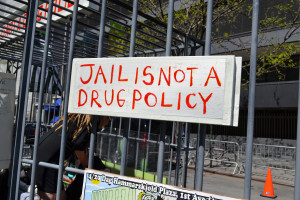

On this edition of Free Culture Radio: Pushing Back Against the Culture of Punishment.
The White House is pushing for a renewed war on drugs. The attorney general, Jefferson Beauregard Sessions III – yes, that’s his real name – issued a memo to all US Attorneys on March Twenty-First, the date of this recording, directing them to use federal death penalty statutes in drug cases where appropriate.
On one hand, the death penalty for large-scale drug offenses makes no sense. People really operating in the upper levels of drug trafficking know that their days are numbered. They know that they will likely face a violent and painful death at the hands of competitors, of greedy underlings, of the police, or possibly a combination of all three.
Capital punishment on the other hand is something that can be fought in court, with words, then if appeals do fail there’s always the prospect of flipping to become a highly-prized and protected informer.
Death penalty for drug offenses is a stupid idea on many levels. Yet, it appeals to the president’s base because hearing about it makes people like me – and hopefully you, dear listener – angry. We’re the ones who always talk about evidence-based policies and reasoned approaches and who take the moral high ground, our president’s supporters are entertained by getting us to rise to the bait and become emotional. It’s trolling on an industrial scale, and it will backfire.
The New York Times, the Los Angeles Times, opinion columnists across the country, civil rights organizations, and many others are now standing up and speaking out against the White House’s push for more drug war. While the president and his attorney general continue on their march of folly, growing numbers of people are moving in a different direction. This week on Free Culture Radio we look at the culture of punishment and the alternative.
The Philippines exemplifies the culture of punishment, with its bloody war on the poor being waged in the guise of a war on drugs, so we hear from Ellecer Carlos, Spokesperson for the “In Defence of Human Rights and Dignity Movement” or iDEFEND, and the Campaigns and Advocacy Officer of the Philippine Alliance of Human Rights Advocates.
The alternative is the Portugal model, where drug use is decriminalized and efforts are made to help those in need with treatment and social reintegration services, so we hear from João Goulão, MD, Portuguese Drugs and Alcohol National Coordinator and Director General of the Intervention on Addictive Behaviours and Dependencies General Directorate of the Portuguese government.
- KBOO
- KBOO


